Suchergebnisse für "Factsheet: Energietechnologien gestalten, die für alle sinnvoll und nutzbar sind"
greening UP! Nachhaltige Grünpflege, Wartung, Instandhaltung von Vertikalbegrünungen inklusive rechtlicher Aspekte
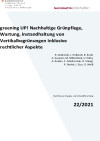
Im Projekt wurden aufbauend auf umfassenden Erhebungen und Analysen von bestehenden vertikalen Gebäudebegrünungen in Außenräumen (boden- und systemgebundene Fassadenbegrünungen) und vertikalen Innenraumbegrünungen passgenaue Grünpflege-, Wartungs- und Instandhaltungskonzepte erarbeitet und rechtliche Aspekte adressiert. Der "greening UP!"-Wissenspool mit konkreten Empfehlungen und anschaulich aufbereitetem Wissen sowie die Konzeption eines digitalen Tools zur "Ersten Grünen Hilfe" runden das Projekt ab.
Schriftenreihe
22/2021
R. Dopheide, J. Hollands, B. Knoll, A. Korjenic, M. Mitterböck, U. Pitha, A. Renkin, F. Schiefermair, R. Stangl, P. Skolek, I. Süss, O. Weiß
Herausgeber: BMK
Deutsch, 162 Seiten
Downloads zur Publikation
Potenzial der ökologischen Optimierung technischer Gebäudeausrüstung durch den Einsatz biogener Materialien (BiBi-TGA)
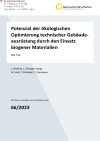
Erhebung des Substitutionspotenzials herkömmlicher Komponenten der technischen Gebäudeausrüstung durch biogene Materialien. Ziel war die Generierung neuer Daten zum ökologischen Verbesserungspotenzial des Einsatzes biogener Ressourcen in der technischen Gebäudeausrüstung in Bürogebäuden. Anhand von LCA-Screenings und Untersuchungen der technischen Umsetzbarkeit wurden die Potenziale analysiert.
Schriftenreihe
66/2023
J. Weithas, L. Eitzinger-Lange, M. Leeb, T.Schnabel, F. Coosmann
Herausgeber: BMK
Deutsch, 60 Seiten
Downloads zur Publikation
BIM2BEM Flow - Kontinuierliche, BIM-basierte Energieeffizienzplanung
Durch eine automatisierte Integrierung und Zuweisung der Austauschanforderungen zwischen Entwurfs- und Simulationsprogramm anhand der ausgearbeiteten Austauschinformationsanforderungen, soll eine kontinuierliche Energieeffizienzplanung entlang der Entwurfsphase ermöglicht werden.
"Gasthermenersatz" - Modular aufgebaute Wärmepumpe mit umweltfreundlichem Kältemittel als Gasthermenersatz im großvolumigen Wohnbau
Das Projekt "Gasthermenersatz" zielt darauf ab, ein Funktionsmuster einer dezentralen, schalloptimierten Wärmepumpenlösung mit seriell- oder parallel verschalteten Kältekreis-Modulen zu entwickeln, zu bauen und zu testen. Diese erneuerbare Technologie ist besonders geeignet, um bestehende Gasthermen im großvolumigen Wohnbau zu ersetzen, und damit den Weg zur klimaneutralen Stadt zu ebnen.
FEELings - User Feedback for Energy Efficiency in Buildings
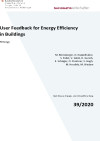
Der Energieverbrauch von Gebäuden wird maßgeblich durch das Verhalten von NutzerInnen beeinflusst. In diesem Forschungsprojekt wird ein neuartiges User-Feedbacksystem untersucht. NutzerInnen geben Feedback zur empfundenen Raumqualität. Auf Basis des Feedbacks werden Einstellungen an der Gebäudetechnik zur Energieeffizienz- und Komfortsteigerung optimiert. Der Proof-of-Concept für dieses neuartige System wird anhand von zwei Use-Cases erbracht.
Schriftenreihe
39/2020
M. Monsberger, D. Koppelhuber, S. Pabst, V. Sabol, H. Gursch, E. Schlager, O. Prentner, S. Singh, M. Herzlieb, M. Wedam
Herausgeber: BMK
Deutsch, 80 Seiten
Downloads zur Publikation
P2PQ - Peer2Peer im Quartier
Das Projekt Peer2Peer im Quartier befasst sich mit der konkreten Umsetzung von Anwendungen zu Photovoltaik-Eigenverbrauchsoptimierung sowie Peer-to-Peer-Beziehungen auf Basis der Blockchain-Technologie in Quartieren und deren Validierung im Echtbetrieb.
Photonic Cooling - Effizientere Gebäudekühlung durch Nutzung von Photonik
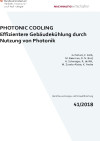
In diesem Sondierungsprojekt wurde der Ansatz des Photonic Cooling zur Gebäudekühlung auf seine praktische und kostengünstige Umsetzbarkeit und im Bezug zu seiner Wirkung bewertet.
Schriftenreihe
41/2018
Gerhard Peharz, Florian Kolb, Martin Beerman, David Neil Bird, Hannes Schwaiger, Rosmarie de Wit, Maja Zuvela-Aloise, Konrad Andre
Herausgeber: BMVIT
Deutsch, 107 Seiten
Downloads zur Publikation
THERM-opti-BALKON-P2 - Thermisch optimierte Balkonsanierung Phase 2: In-Situ-Versuchsanlage
Bei der thermischen Sanierung von Gebäuden stellen frei auskragende Balkone ein besonderes Problem dar. Mit dem THERM-opti-BALKON-System wird derzeit unter Laborbedingungen ein diesbezüglicher Lösungsansatz erforscht. Phase 2 soll eine In-Situ-Versuchsanlage unter realen Bedingungen als Technologiedemonstrator schaffen. Wichtigster Untersuchungsgegenstand ist das Langzeitverhalten des THERM-opti-BALKON-Systems.
P2PQ - Peer2Peer im Quartier
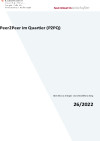
Das Projekt Peer2Peer im Quartier befasst sich mit der konkreten Umsetzung von Anwendungen zu Photovoltaik-Eigenverbrauchsoptimierung sowie Peer-to-Peer-Beziehungen auf Basis der Blockchain-Technologie in Quartieren und deren Validierung im Echtbetrieb.
Schriftenreihe
26/2022
Herausgeber: BMK
Deutsch, 43 Seiten
Downloads zur Publikation
3D*3B - 3D-Concret Printing, Reinforcement for low carbon and bending stressed structures.
The project is about 3D printed structural elements and their integration in building structures. The focus is predominantly set on bending stresses structural elements like panels and slabs. Results will point out technical, logistic and climate relevant aspects.
BIM2BEM Flow - Continuous BIM-based energy efficient planning
Automated integration and assignment of exchange requirements between the design and simulation programs, based on the elaborated exchange information requirements, should enable continuous energy efficiency planning along the design phase.
6D BIM-Terminal: Missing Link for the development of CO2 neutral buildings
The present project aims to close the gap between specialist consultants and Building Information Modeling (BIM) applications. For that, relevant data for cost estimation, scheduling construction planning and management or sustainable building operation and facility management, shall be added automatically to BIM elements and imported into the respective specialist planning software. This data exchange shall be carried out using IFC interface according to ÖNORM A6241-2 and the properties of the ASI properties server via a central platform, the "6D BIM-Terminal".
greening UP! Sustainable green maintenance, maintenance, maintenance of vertical greenery including legal aspects
Based on extensive surveys and analyses of existing vertical building greenery in outdoor areas (floor and system-bound façade greening) and vertical interior greenery, the project developed tailor-made green care, maintenance and repair concepts and addresses legal aspects. The "greening UP!" Knowledge pool with concrete recommendations and clearly presented findings as well as the conception of a digital tool for the "First Green Aid" complete the project.
Itz Smart – Carbon neutral city district development Itzling – Implementing innovation and technology via co-operative process design
The goal of the project “Itz Smart” is to tie in with existing activities and to consistently develop Itzling as a residential location further. In the test and demonstration area, sustainable residential quarters with trendsetting solutions for mobility are developed in the zone of the transport axis (railway and Schillerstraße) and along the local supply axis (Itzlinger Hauptstraße). The consideration of housing and mobility with regard to the aspect of “city of short ways“ also entails a discussion of determined mixed utilisation and the development of such residential quarters.
ÖKO-OPT-QUART - Economically optimized control and operating mode of complex energy networks of future city districts
In the project ÖKO-OPT-QUART energy-based, economic and control-orientated models will be developed in order to simulate the operating mode of complex, sustainable energy networks in city districts. For an exemplary configuration these models will be combined to an overall model which allows a realistic economic comparison of different control strategies. The final goal of the project is the development of a method for the systematic design of cost-optimized, predictive control strategies for complex energy networks in city districts.
see-it - Camera based, user centric daylight control system for optimized working conditions
In the project technologies in the field of building construction and building automation are being researched for quality and performance improvements in the workplace. The aim is to individualize the control of sun protection to the people who need to be protected from glare and overheating and hope to see through.
Sani60ies - Demonstration of minimally invasive thermal and energetic refurbishment of classic 1950s and 1960s apartment buildings
System development of a façade-integrated building component activation for "warm" refurbishments with high transfer potential to buildings of classic apartment complexes from the 1950s and 1960s. The system is being tested and further developed based on three building projects and demonstrated through broad application (over 200 flats).
ecoRegeneration: Development of a "Merit-Order" in order to assess regeneration heat for geothermal probes within urban residential neighbourhoods
In urban residential areas there are not enough active-cooled usages, to use the waste heat of the cooling process as required regeneration heat for geothermal probes; free cooling of the apartments is not sufficient. The project is developing various options (waste heat from commercial uses in the ground floor zones of residential buildings, by using waste heat of data centres, additional installation of heat generation systems for regeneration) within the urban settlement area, business models and is calculating life-cycle-costs of all solutions. The result should be a kind of "merit order" for regeneration heat.
The Box - Thermal High Performance Decoupling - Next Generation Thermal Break Technology
The project pursues the overall strategic objective "solution of the problem-inducing heat bridge". For this purpose, the thermal bridging losses should be reduced by the factor of 15 in contrast to the state of the art. The significant increase in efficiency should rely on existing system solutions, but incorporating a new holistic view in terms of construction, geometry and materials.
SPIDER - Subtraction as a measure to Preserve and Insulate historic Developments by Electric Robots
The purpose of this exploration is to unlock the potential of autonomous, data-driven robots that achieve improvements of the thermal building performance through air entrapments in a continuous process.
